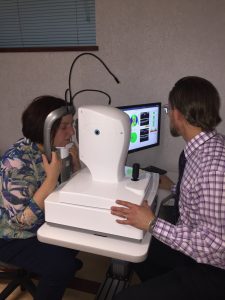COMPREHENSIVE ASSESSMENT OF OCULAR HEALTH
 As technology continues to improve, we are better able to look at the human eye with the Optovue OCT machine. OCT Angiography (OCTA) is a quick non-invasive piece of equipment which performs a test, allowing your eye doctor to see retinal vessels during your annual eye exam. OCTA is the only non-invasive way to visualize the vascular structure of your retina.
As technology continues to improve, we are better able to look at the human eye with the Optovue OCT machine. OCT Angiography (OCTA) is a quick non-invasive piece of equipment which performs a test, allowing your eye doctor to see retinal vessels during your annual eye exam. OCTA is the only non-invasive way to visualize the vascular structure of your retina.
During this test the structure of your eyes are examined- from the front, or anterior segment, to the back, or retina. OCT is used to aid in diagnosing disease and managing your ocular health. These metrics along with a high-resolution image and symmetry analysis help to determine if you are displaying the early signs of retinal disease or glaucoma.
The machine allows us to look at the eye in a similar manner as an MRI. It takes a piece by piece view of the eye. Our optometrists then look at this imagery and are able to determine the health of your eyes, or if there are any concerns that need to be further addressed.
So what does this mean for you, the patient? These scans are able to detect early vascular changes in diabetic patients and early signs of glaucoma. We cannot stress the importance of early detection of eye diseases enough. Early detection can help to prevent further loss of vision. As we have talked about before, you can lose a significant amount of your vision without you noticing.
Bissell Eye Care continues to invest in the most up to date technology and equipment in order to best serve our patients. We are one of a handful of optometry practices in the Pittsburgh region to offer screenings with the Optovue OTC Angiography machine. By using this technology, we are able to better facilitate the diagnosis and management of eye diseases, many of which may lead to permanent blindness.
About the author: John D. Bissell, owner of Bissell Eye Care and Tri-State Low Vision Services, offers comprehensive eye examinations for the entire family, ocular disease detection and treatment, eye glasses, sun glasses, active wear, contact lenses, and low vision examinations for those with significant vision loss. He has undergone specialized training for treatment of low vision by the International Academy of Low Vision Specialists utilizing customized telescopic eyeglasses, prisms and telescopic implants for patients who qualify. The practice accepts most types of vision and health insurance plans.
